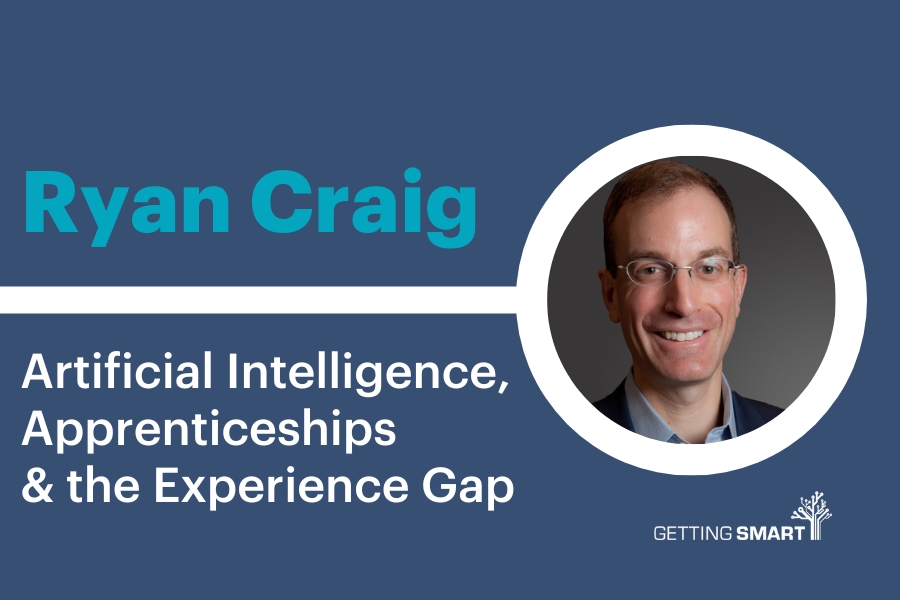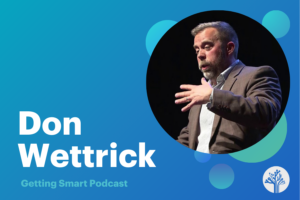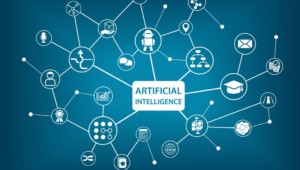Ryan Craig on AI, Apprenticeships and the Experience Gap
Key Points
-
It is harder to scale pathways if they don’t have a reliable, guaranteed option for employment at the end of them.
-

This episode is supported by our recent Artificial Intelligence publication which focuses on the ways in which AI is shaping teaching, leading and learning.
On this episode of the Getting Smart Podcast Tom Vander Ark is joined by Ryan Craig, Managing Director of Achieve Partners. Ryan is leading the development of the Hire/Train/Deploy sector, a new category of intermediary organizations that take the friction out of hiring–for companies as well as job seekers.
In his 2018 book, A New U: Faster + Cheaper Alternatives to College Craig made the case that unless you get a free ride to a top school, you should find a free or affordable sprint to a good first job.
Ryan’s upcoming book, Apprentice Nation: How the “Earn and Learn” Alternative to Higher Education Will Create a Stronger and Fairer America, will focus on economic mobility and a more durable American job market.
The key to expanding apprenticeship is the apprenticeship intermediary. It’s not the end employer, it’s an intermediary organization that does the heavylifting of setting up and running the apprenticeship.
Ryan Craig
Transcript
Tom Vander Ark: Ryan, why are you such an advocate of apprenticeships?
Ryan Craig: So many reasons, Tom. First, it’s really the only level playing field to economic opportunity and mobility, as opposed to being a tuition-based, debt-based education training pathway that inherently discriminates against those with fewer resources. An apprenticeship, by definition, is a job that pays a living wage with structured training built in that helps you make more as you gain more skills over time. Unlike everything else, it is truly a level playing field. It doesn’t matter where you come from or your background; you’re able to access it.
The second reason is that I talk a lot about the skills gap in America driven by digital transformation. Many of the most in-demand and hardest-to-find skills are actually harder to learn in a classroom than by doing, and that’s what apprenticeship is—learning by doing, earning, and learning on the job. That’s a major benefit. And the third reason is just the failure of our traditional education and workforce infrastructure to address the problems we’re seeing in terms of economic opportunity and inequality. Although we don’t have a lot of data points on apprenticeship, the data we do have demonstrates it’s probably the most powerful tool we have to address these issues. As my last book argued, alternatives to college need to be explored, and I’ve decided that the alternative should be apprenticeships.
Tom Vander Ark: You’re listening to the Getting Smart podcast. I’m Tom Vander Ark, and I have the pleasure of being joined by Ryan Craig. Ryan, it’s so good to have you on.
Ryan Craig: It’s wonderful to be back, Tom. Thanks very much. I think this is my third time, right?
Tom Vander Ark: Yes! Ryan is the managing director of Achieve Partners. Ryan and I serve on the board at Mastery Transcript Consortium together. Ryan mentioned his 2018 book A New U: Faster and Cheaper Alternatives to College, which, in my view, was the best book on higher education in the last decade. 2018 marked a turning point in how America views higher education. Many of us began to realize that the ROI of a college degree had dropped, that costs were skyrocketing, and that skills requirements were changing. I think a lot of us see your book as marking this shift, which was accelerated by the pandemic. It increased the visibility of college alternatives and decreased college-going rates, further underscoring the issues you raised. What’s your perspective on it now, about six years since you started writing that book?
Ryan Craig: That’s right. If my tombstone reads “The man who called BS on college in 2018,” I’d be fine with that. We’ve seen five years of successive enrollment declines since then. Back then, we saw the emergence of faster and cheaper alternatives to college, what I termed “last mile training”—reflecting boot camps, income-share programs, industry-recognized certifications, and the like. There’s some mention of apprenticeships in that book, but it wasn’t a dominant focus.
What we’ve learned since then is that these pathways don’t scale particularly well unless there’s some kind of guaranteed employment outcome at the end. That’s hard to achieve from an “education-up” standpoint, starting as an education training program—especially from the standpoint of an accredited college or university. Colleges aren’t employers, and their connections with employers are often tenuous. Coding boot camps and other education-up models have faced this same challenge. In 2017, we made our first investment in Revature, a software developer staffing firm, where we built last-mile training directly into the model. It wasn’t called apprenticeship, but that’s effectively what it was—hiring, training, and deploying software developers from scratch.
Tom Vander Ark: I think that for me marked the beginning of what we now call the hire-train-deploy sector. Today, it’s a thriving sector, typically post-baccalaureate, that picks up college graduates and gives them team and tech skills before deploying them in the tech sector and beyond. Would you say that’s the main work of Achieve Partners?
Ryan Craig: Yes, exactly. We’re building Revature-like companies across dozens of sectors where there’s a talent gap. We’ve expanded from software development to data, cybersecurity, healthcare IT, and beyond. We even have a company in behavioral healthcare and nursing called Ro Health. Every company we build is about hiring, training, deploying, and creating change in hundreds or thousands of lives by building apprenticeship infrastructure that’s sorely needed.
Tom Vander Ark: In many respects, you’re doing what higher education should be doing—building the knowledge and skills that people ought to receive in the degree they just paid for. Is that fair to say?
Ryan Craig: Sort of. All our companies partner with universities. I often tell university partners, “You’ve done the hard work in developing cognitive and communication skills; we’re just doing the last mile.” Without it, they wouldn’t be getting these jobs, and their careers wouldn’t be launched. Could colleges incorporate this? Perhaps, but it’s hard. Strong relationships with employers are essential. For instance, when we wanted to do Workday, we bought one of the fifty Workday partners, so they already had the relationships and expertise.
Tom Vander Ark: Last time we talked, I asked if this hire-train-deploy sector would expand to pick up people out of AA programs. Infosys has done some of that. Is that starting to happen more broadly?
Ryan Craig: We’re working hard on it, aiming to get digital marketing and other platforms off the ground that could work even for high school graduates. The challenge is that every time we launch a new program, we have hundreds of applicants for every open seat. It’s very selective, with cohorts often majority underrepresented minorities. It’s hard for high school grads to compete with college grads when you have 200 applicants for each seat.
Tom Vander Ark: Since we last spoke, you co-founded Apprenticeships for America and finished a new book called Apprentice Nation: How the Earn-and-Learn Alternative to Higher Education Will Create a Stronger and Fairer America. Tell us why you started this nonprofit and a bit about the book.
Ryan Craig: The book lays out why apprenticeships are so important and why we need more of them. The U.S. has only 500,000 civilian apprenticeships right now, which is less than after World War II. Other countries have far more. For every dollar of taxpayer support for college students, apprentices receive only about two and a half cents. This thousand-to-one funding imbalance is unfair, especially since apprenticeships don’t discriminate against those with fewer means. If we want to increase apprenticeships, we need intermediaries—organizations that set up and manage apprenticeship programs. In the UK, 1,200 such intermediaries exist; in the U.S., we have just 200.
Tom Vander Ark: Do you think apprenticeships could serve 20% of job pathways?
Ryan Craig: Absolutely. Our goal at Apprenticeships for America is to get to five million apprenticeships. We want a thirty to forty percent solution, expanding beyond construction trades to sectors like healthcare, tech, and financial services. Countries like the UK recognize that intermediaries are key. In the UK, every large or mid-sized employer is approached multiple times by intermediaries offering to set up apprenticeships. We lack that in the U.S. due to a lack of formula-based funding.
Tom Vander Ark: Apprenticeships should always be paid, right?
Ryan Craig: Yes. Apprenticeships are jobs, with built-in training. It’s not a boot camp or a training program—it’s a job with training. Apprenticeship is the most desirable model, once we build the infrastructure we need.
Tom Vander Ark: So there are different models, like SkillStorm’s hire-train-deploy or Multiverse’s apprenticeship service provider. What’s the employer’s responsibility?
Ryan Craig: Employers generally won’t solve this on their own. That’s why intermediaries are key. There will be intermediaries for apprenticeships, internships, and work-integrated learning to bridge the gap because employers typically won’t connect with schools on their own.
Tom Vander Ark: So, pathways are more important than ever. We need career exploration and vocational identity development earlier. Does that sound right?
Ryan Craig: Absolutely. High schools and colleges will need to incorporate work-based learning, internships, and apprenticeships to prepare students for the workforce.
Tom Vander Ark: We’ve been talking to Ryan Craig. He’s the managing partner at Achieve Partners and co-founder of Apprenticeships for America. Ryan, thank you for your advocacy and investment work in rethinking pathways to employment.
Ryan Craig: Thanks, Tom.
Tom Vander Ark: Thanks to our producer Mason Pasha, and the whole Getting Smart team. Until next week, keep learning, keep leading, and keep innovating for equity. See you next time.
Links:
- Ryan Craig on Last-Mile Training as an Alternative to Higher Ed
- How Faster + Cheaper Alternatives Will Replace Much of Higher Ed
- Apprenticeships for America
- Apprentice Nation: How the “Earn and Learn” Alternative to Higher Education Will Create a Stronger and Fairer America
- Skillstorm
- Optimum Healthcare IT
- Riipen
- CreatorUp
- A New U: Faster + Cheaper Alternatives to College
- Ryan Craig
- Achieve Partners







0 Comments
Leave a Comment
Your email address will not be published. All fields are required.